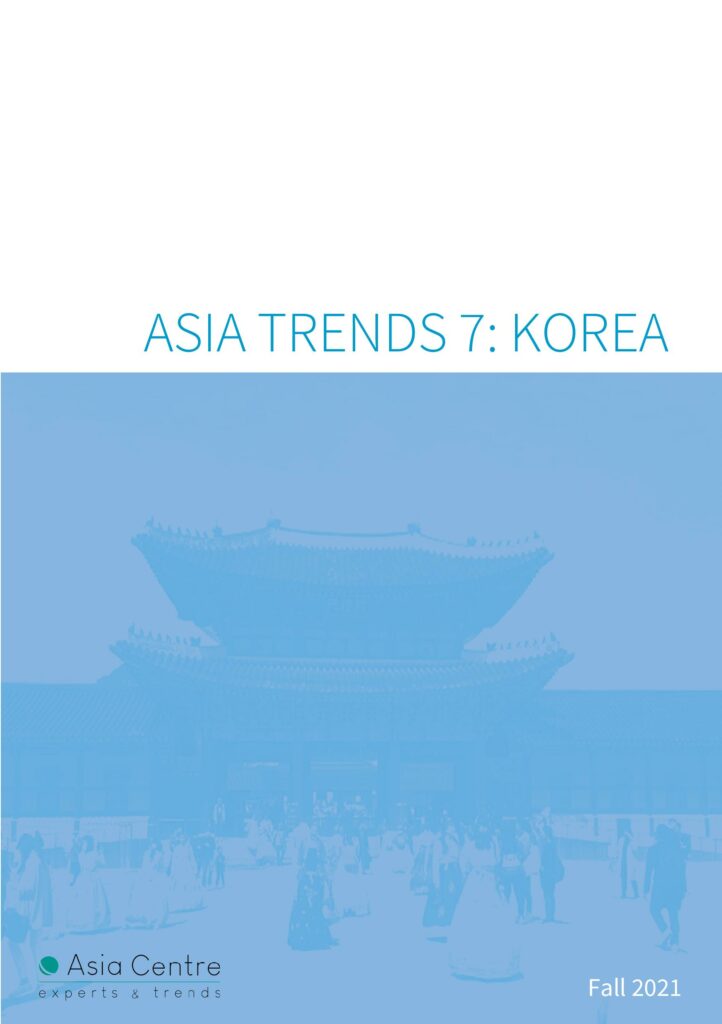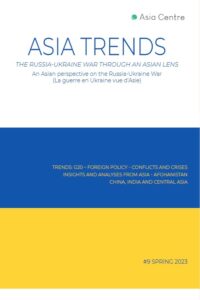Editorial
While, throughout 2020 and due to the pandemics, our “Asia Trends” could not be released as regularly as should, i.e. on a half-yearly basis, we are particularly proud to present this second issue of our periodical for 2021. Asia Trends had been following a standard pattern which had led to consider issues common to several countries in Asia through transversal approaches. Most of the times articles have been a reflection of newspapers or journals published in original languages in the countries of reference, thus illustrating our motto and basing our researches and outputs on local sources. Previous issues have followed this pattern, including the latest one (in French only) devoted to Chinese contemporary thinkers in the field of political philosophy.
For the current issue, we have chosen to slightly diverge from the habit, “innovate” yet are proud to extend our in-depth approach to various topics related to contemporary Korea. Although “hallyu” (한류 or 韓流 ), the « Korean wave » which appeared in the West with the new century, achieved a lot in terms of improving knowledge and understanding of Korean issues, there is still a significant shortage of deep understanding, if not empathy or curiosity for issues Korean, especially in some countries in Europe. Although this Asia Trends number has devoted space for an update of « hallyu » as it now stands and while Korean cultural objects have become more familiar to the West (see article by Angeliki Katsarou, Stockholm University) the array of topics covered have deliberately been chosen as the widest possible . As a matter of fact they go from a review of the specific situation in Korean peninsula within the contemporary complex of international relations (Pr Bertrand Badie, an article which we deliberately and exceptionnally left in its original French version) to the potential evolution of ROK’s positioning vis-a-vis the G7 organisation (Dr Paul André). Some of the articles published here echo an e-conference held in November 2020, for which we thank the authors to again bring their new or updated contribution. The conference had convinced us that the interest for a better understanding of Korea was real. Dealing with interlocutors from a place open to debate, directly exposed to global challenges as is ROK, the size and the potential influence of which make it more than a valid peer and partner for many an European country and overall to EU as a whole should go higher in the agendas of Western leaders and especially in Europe, following the tenth anniversary of the strategic partnership which our earlier event had celebrated.
We could not avoid topics of particular relevance as the pandemics currently recedes everywhere. Raising the awareness of the efficient and specific approach adopted from the inception by ROK seemed important to us as was an attempt to
understand the roots of this approach, as it is engrained in a political culture which makes ROK « different » (article by Pr Christophe Gaudin and Cedric Legrand). Other security challenges facing ROK are also studied in several articles (Dr Leveau, Dr Peron-Doise, Dr Elisabeth Suh) while two articles point out to key issues of relevance for the future, current perception of ROK within EU and the potential for an ever growing appreciation of ROK’s standing (Rafal Smoczynski) and of the Korean «innovation engine » (Asta Diabate, Hong Soo-min). Overall, the identification of many a convergence point between « ageing democracies » like the ones in Europe and dynamic systems like the one which is gradually maturing and developing as a mix of national values and borrowings from Western essential pillars of democracy can justify an ever growing appetite to learn more about Korea, especially at a time where Western European countries could face threats and challenges similar to those ROK has long been exposed to.
ACCESS THE PDF FILE:
Asia Trends #7 - Autumn 2021.PDF
...

THIS IS MEMBER-ONLY CONTENT.
To view or download more of this content please subscribe.
If you are already a member please login.



